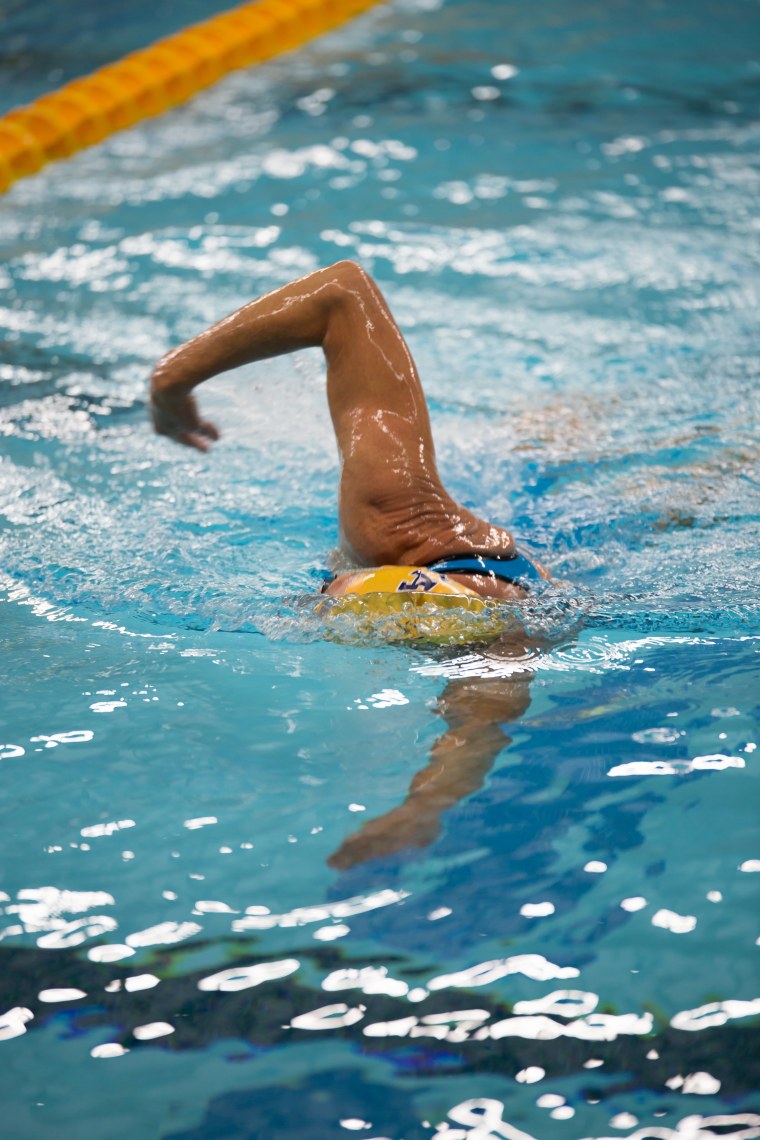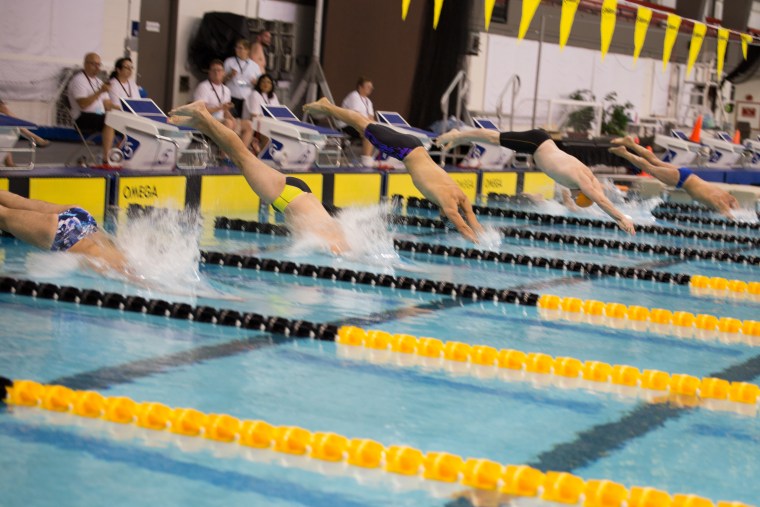Numbers of openly gay athletes competing in Rio are said to have doubled since the 2012 summer Games in London, putting a global focus on the world of athletics, where identifying as LGBTQ does not always align with stereotypical notions of sporting. But openly LGBTQ athletes thriving in an environment sometimes thought of as homophobic or aggressive, can serve as role models to younger athletes, many of whom, may be struggling to come out.
“There are still children who are bullied, thrown out of their homes and generally ostracized,” said Kent Lau, swimmer for Team New York Aquatics (TNYA), the world’s largest LGBTQ masters level aquatic sports team. “If they see someone winning an Olympic gold medal, who’s popular, successful and openly gay and happy, it gives them hope and teaches their parents and support system that it’s OK to be gay.”
TNYA was established in 1988 ahead of the third annual Gay Games in Vancouver –- an event running every four years, bringing together LGBTQ and ally athletes in an inclusive sporting competition. Parallel to the creation of the Gay Games in 1982, TYNA was born so the LGBTQ community could have a space to be themselves, using sport as a positive counteraction to anti-LGBTQ attitudes.

Now boasting an estimated 600 members, TNYA Co-Chair David Hildebrand has seen major advancements in LGBTQ rights but thinks more needs to be done -- especially in the area of athletics.
“Homosexuality, in general, is equated with weakness,” he told NBC OUT. “I think that sports encourage a lot of toughness and a macho approach, which homosexuality doesn’t really jive with. People who identify themselves as gay probably learn to ignore, suppress or deny it.”
More than 40 publicly known LGBTQ athletes are competing in this year’s Olympics in Rio, including married couple and Team Great Britain field hockey members Helen and Kate Richardson-Walsh. While the numbers are record breaking, women monopolize the statistics with only 11 gay male athletes recorded –- none of them from the U.S., according to LGBTQ site Outsports.
RELATED: Why Are Team USA's Openly LGBTQ Olympians All Women?
“Female athletes embrace one another more easily than men, and I do think it is easier to be female and out in a sport setting than male,” said Jaclyn Miller, commissioner of the women’s division of New York City’s Gay Basketball League (NYCGBL). “They don’t have this macho, manly-man persona to live up to."
"I also think from a media and fan perspective, it’s easier on the women’s side, because they are usually more accepting, in part because of these long-standing societal beliefs about femininity and masculinity. You never know how your coach, referee or even teammates will react," Miller added.
In the 1984 Olympics in Los Angeles, anchor swimmer Bruce Hayes helped win the gold medal for Team USA’s 4x200m freestyle relay team, beating West Germany’s Michael Gross, a world record holder. In 1992, Hayes made history again by publicly coming out as gay.
“If he had been an out athlete at the time, he could have shown the world that this is what a gay athlete can do,” Hildebrand said. “On the other hand, if society isn’t ready for that, it would have found a way to ignore him, and he may have lost all his support. People need time. Timing is so important.”
RELATED: 11 Out Olympians You Should Know
Research completed in 2015 by Out in the Fields -- the first international study exploring homophobia in sports -- found more than half of American participants surveyed believed lesbian, gay and bisexual people are "not accepted at all" or are "accepted very little" within U.S. sports. The study, which surveyed both gay and straight people, also found 70 percent believed homophobia was more commonplace in sports than anywhere else in American society. Nearly 80 percent believed youth team sports were not safe for lesbian, gay and bisexual people.
Due to his personal experience as a young, closeted athlete, Jeremy Davidson, now involved with both San Francisco Tsunami Aquatics and International Gay and Lesbian Aquatics, makes it a priority to help facilitate safe spaces for LGBTQ athletes and allies.
“I came into masters swimming relatively late but had been a swimmer in high school,” he told NBC OUT. “I assumed I wasn’t good enough to swim in college. I was struggling with hiding my sexuality, and the leap to college heightened the challenge. Later in life, I was generally more confident in myself and pursued swimming again."
"Since I’ve been on the team, I’ve developed more confidence in pushing myself mentally and a deeper level of athleticism and competitiveness. Now that I’m on the board, it’s about helping and sustaining a safe space for others to do the same on our team," Davidson added.
Organizations like TYNA, NYCGBL and the ones Davidson helps lead, work on changing team culture to one where sexual orientation is a non-issue, often inspiring athletes to take more risks –- both on the field and off -- due to the comfort they feel in being who they are.
“I think there are more people in this country that would rather see an American win, rather than have their training compromised because they are competing closeted and are therefore not as comfortable,” Hildebrand said.
Over the past several weeks, the sports world has been a mixed bag when it comes to LGBTQ issues. On the pro-LGBTQ side, we've seen, for example, a record number of out Olympians and the NBA announce it's moving its 2017 All-Star game from North Carolina due to the state's anti-LGBTQ HB2 legislation. On the negative side, we've seen homophobia in the stands at a U.S. women's soccer game in Rio, as well as insensitive media coverage, with the Daily Beast and NBC Sports (also owned by Comcast/NBC Universal) among the organizations criticized.
